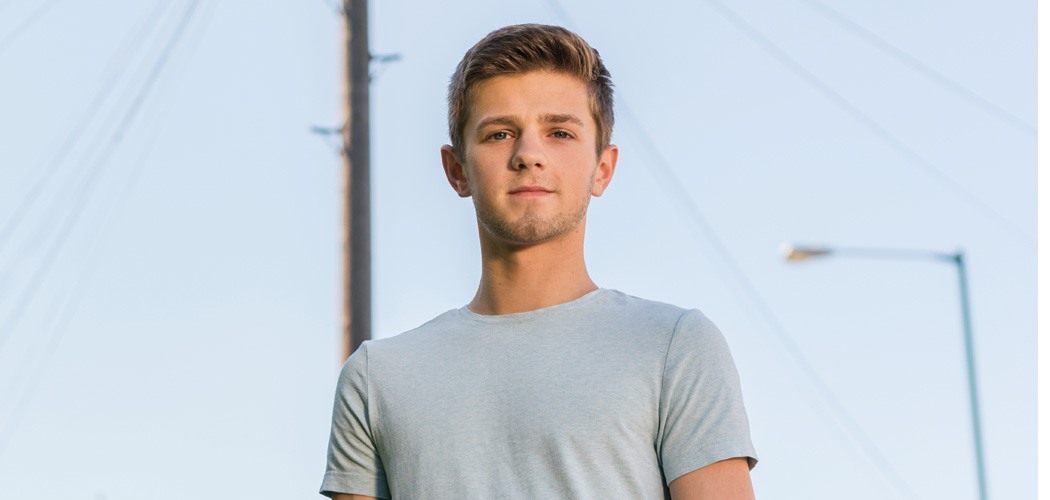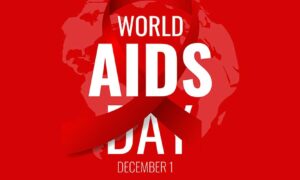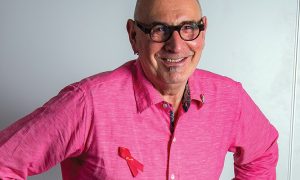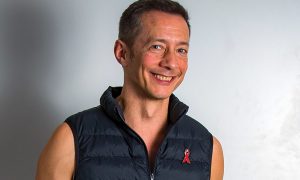Actor, blogger and HIV activist George Hankers is one of several young gay men appearing in Terrence Higgins Trust’s latest campaign It Starts With Me. Here he talks to Boyz about his experience of living with HIV.
Tell us a bit about yourself – where were you brought up, your studies, what you do for a living, etc?
I was born down in Chichester, West Sussex, and I lived there until I was 16. Then I moved to Epsom to study musical theatre and after that I came to London. I’m now 22, I’m a professional actor and I work in musicals.
When did you become HIV positive?
It was when I was just about to graduate college, so I was 19 years old.
Did you show symptoms before your diagnosis?
I didn’t show any symptoms that I was aware of. But I had tonsillitis really bad, so I was in bed for about 10 days and my doctor just thought that it was tonsillitis. But it wasn’t until later that I realised that it was my body fighting off the initial virus.
And did your doctor know that you were gay and having sex?
We didn’t ever speak about it.
About your sexuality?
No. Because he wasn’t my sexual health doctor. He was a normal GP and he thought I had tonsillitis.
So how did you find out you had HIV?
It wasn’t until later on. My health got better, I was doing OK. I was having a full medical test done on Harley Street because I was about to start a new job and they required a medical test. And that’s when it came back; they called a few days later and said that I was positive.
And was it a huge surprise?
It was, yeah. I think because I was only 19 at the time you don’t ever think that it would happen to someone your age. You think HIV’s a thing of the past. Personally I didn’t have much education about it, so I feared the worst and it consumed a lot of emotional energy for quite a long time.
When you were told about your positive diagnosis, how did you feel at that moment?
I felt really empty, to be honest. When I was told, I felt like I had nothing inside of me. I sat on my bed and felt nothing. It’s a really bizarre concept to explain, but it feels like everything has just been taken away from you. I didn’t know what to do with myself. I didn’t know the first step, who to tell, what to do with this. It was a very difficult thing to think about, especially at the age of 19.
And what was the next step? Were you offered support or counselling? How were you supported emotionally?
I didn’t have any professional counselling; I had a few close friends who were able to support me enough through my difficult time.
Did you have any friends at that point who you knew were HIV positive?
No, I knew no one. I’d met someone who was HIV before and we’d spoke about it, but I didn’t know them well enough to go to.
Before you became positive, what was the extent of your sexual health education?
Well we talked about it at school and I’d go to regular check ups, because obviously as a gay man it was probably ideal to. But you don’t think these things will ever happen because you use protection and you take precautions. So my education was OK but it probably wasn’t the best because there were things that I didn’t know about HIV. Sexual health as a whole, it was alright.
So as a sexually active young gay man you were using protection as well as you thought you could?
Yeah. Obviously there are different viruses you can pick up, but when it comes to HIV it’s something you think was a thing of the past and whenever it was talked about in school it was almost as if it didn’t happen in the UK; it was a foreign thing that didn’t affect us here.
Which leads me into my next question: what was your perception of HIV before your diagnosis?
I didn’t really know anything about HIV. I didn’t know how we’ve progressed in being able to tackle the virus. So as I say, I didn’t think it was something that happens now.
As a young, good looking guy, what have reactions been like when you’ve shown interest in other guys and then revealed your status?
It’s been quite interesting. I’ve never had bad reactions when it comes to telling people about my status. People have never said ‘I don’t want to come near you’ or ‘I don’t want to do anything’; it’s all been OK. And I’ve dealt with a few people who have been very supportive. It’s very important to understand the facts of the virus, and once you really understand them then it kind of puts you at ease because you know it’s not a bad thing and it’s not going to kill you. Also because I’m now undetectable the people I’m dating are actually not at risk, because undetectable means I’m uninfectious. So the reaction has been pretty OK. I’ve dated a couple of people since I’ve been positive and it’s always been supportive, so I’ve been lucky.
So you always make a point of disclosing your status before you do something with someone?
Yes.
Why have you decided to be so open and public about your status?
For education. For a long time I sat around and didn’t do anything; I was wallowing in self-pity. Then I realised that if other people are going through this then where are we going, what progress are we making? So I decided that if I was to lead by example and educate people and show that I’m an advocate of living openly with HIV then people will start talking. I wanted to create a responsible conversation with a message of prevention and support.
What has the response been like from your family?
My family has been incredible. I didn’t know how they were going to respond at all. My mum was very upset, obviously, but she went away and researched and felt a lot better. My dad already knew quite a lot of information because he has friends who have had HIV since the 1980s. So it was really interesting to see that difference in reaction, and that difference was because of education.
Did you tell your parents together or separately?
I told them separately and I wrote letters. I thought that if I wrote everything down I’d be able to say everything I wanted to say and I knew exactly what they’d understand. So I figured writing a letter would be a better way for me personally to get information across.
And did you hand it to them?
I posted it to them and they contacted me separately later in the week and we each had long phone conversations about how I was and next steps and keeping them up to date. They’ve been very supportive; I’ve been very lucky.
What have you learnt from being positive?
Being positive has kind of brought me back down to earth a bit. It’s made me realise that life is precious and you have to look after yourself and chase your dreams. There’s no point in wasting time: if you’re not happy doing something, don’t do it; if you’re not inspired by something, walk away. I just think that life’s too short to be stuck under your covers depressed because things aren’t going the way you planned. It’s actually inspired me to be a better person. And that’s not an overnight process, it’s all about finding your own way and making yourself happy.
How did you feel when your doctor explained undetectability to you?
The word ‘undetectable’ put everything at ease for me. I feared the worst when I was diagnosed, and it wasn’t until being undetectable was explained to me that I felt a sense of hope. I knew I wasn’t infectious and I knew that my health would be able to rebuild itself. So that was a beacon of light and quite emotional.
What would you say to someone who has recently been diagnosed positive?
I’d say embrace the journey. It’s not going to be easy. You’re going to have to fight things you never thought you’d have to before. And it’s going to be tough, but it’s going to make you a stronger person, everything’s going to be OK, and it doesn’t change who you are on the inside.
And what would be your message be to someone who is negative?
Support is one of the most important things you can provide. And through educating yourself you will protect yourself from the virus and you’ll be able to be there for the people who already have the virus.
And finally, what do you hope to be doing in 10 years’ time?
As an actor you never know where you’re going to be next week so it’s a bit difficult to think that far ahead. But I want to be on stage, I want to be in shows, and that’s what I’m doing, so hopefully my passion still lies there and I’ll be doing that.
Get tested and stay protected – find out how at StartsWithMe.org.uk.
Catch George blogging at StillHumanBlog.com and follow him on Twitter via @StillHumanBlog and @GeorgeHankers.














